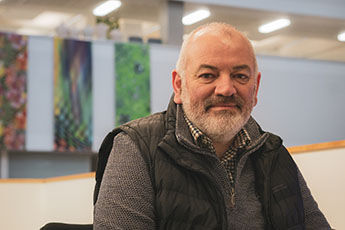Mathew Porton
Course Leader and Lecturer - BA (Hons) Horology
What is your background/experience prior to BCU?
Mat qualified as a professional engineer and previously pursued a career in engineering and project management before making a change to Horology in 2010. A desire to get back to the practical side of engineering saw him studying at Birmingham City University where he gained the British Horological Institute qualifications in clock and watch servicing. On qualifying in Horology Mat was also awarded the Institute Bronze Medal given for attaining the highest achievements in the studies. Subsequent experience working with clocks and watches then led to him becoming a Fellow of the Institute.
For over a decade now Mat has run a business focusing on the service, repair and conservation of mechanical clocks and pocket watches. This now runs alongside his role as Horology Lecturer at BCU and the two roles complement each other with the commercial clock repairs often providing examples of work that can be used in demonstrations and lectures.
Practical workshop skills form the core of Mat’s work with clocks and watches focusing on the importance of hand skills, tools and techniques before moving on to include lathe-work and other workshop machines.
What is your favourite thing about BCU?
The creative environment where understanding, making, repairing and conserving horological items is possible and supported by a team of staff skilled in many technical disciplines.
What inspired you to teach Horology at BCU?
I have always felt that passing on skills and developing the next generation in practical subjects is important. Having studied at BCU myself it is very satisfying to be a part of passing that knowledge on.
What are the benefits of studying Horology in Birmingham?
Horology covers a wide area of practical skills and the theory and knowledge behind those skills. It also spans changes in technology and manufacturing from very early pre-industrial through to the most modern techniques and technology. There is scope to satisfy a wide range of interests and to lead on into employment in careers from modern watch servicing and manufacture to repair of antique and vintage clocks and watches and also conservation and museum curation.
What can students do to help prepare them for the course?
Our course is a practical one. We use many tools, machines and techniques to support our work, but crucial to many roles in Horology is the development of good hand-skills. Getting some practice using hand tools of any kind will really help prepare for refining those skills to be able to make finer, smaller and more intricate components in the future. Any little practical project making something using techniques for marking out, cutting, filing and finishing along with practice using screwdrivers and tweezers will be time well spent.
Lastly, do you have any advice or tips for working in the industry?
There are different paths to choose in employment within Horology. Explore them and try the different techniques out. Not everyone leaves here following exactly the path they imagined when they started.
For practical work, get good at the basics and build on it. Don’t expect to be an expert in fine work straight away. Practice to improve speed and reliability and this will also improve confidence.